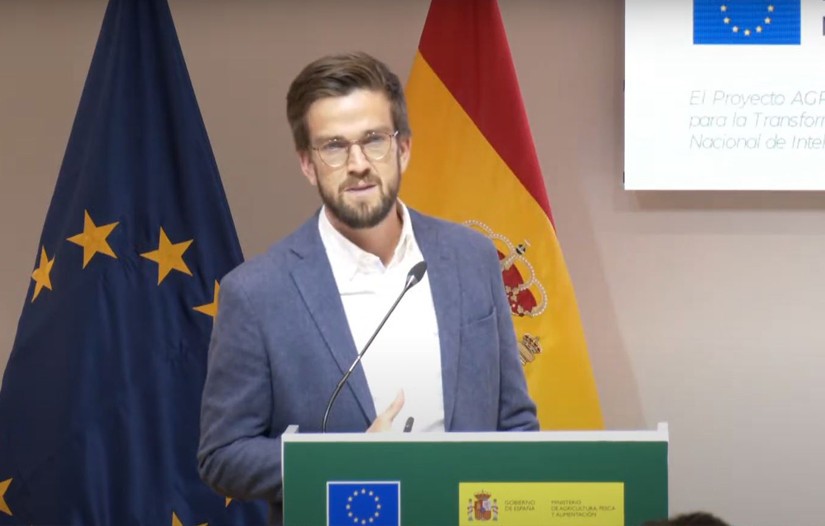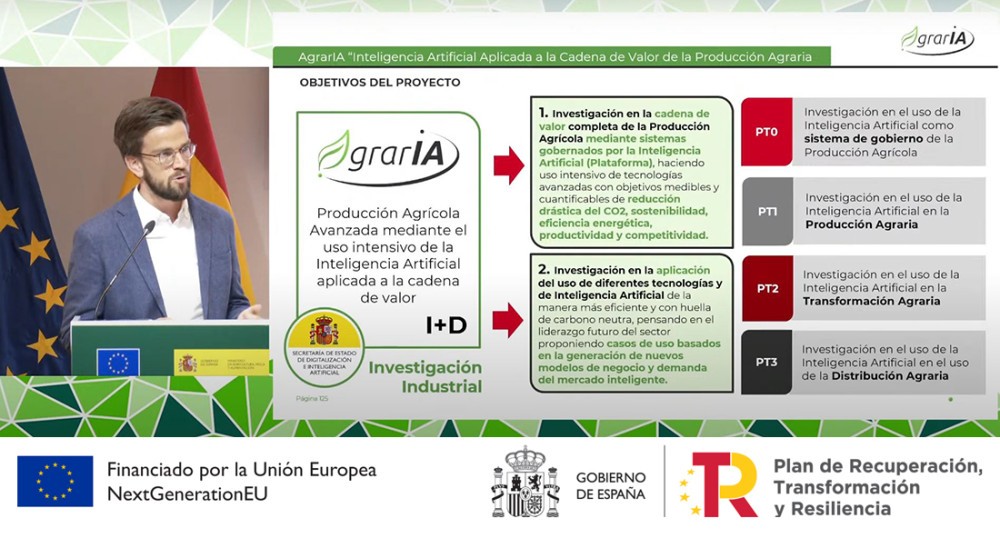Presentation of the AgrarIA project at the Artificial Intelligence and Robotics Applied to the Agri-Food Sector conference

iHub La Vega Innova’s facilities hosted Artificial Intelligence and Robotics Applied to the Agri-Food Sector, a key conference for the agri-food sector. The goal of this event, organized in collaboration with the Ministry of Agriculture, Fisheries and Food, was to present the Spanish node of the AgrifoodTEF project and to highlight the progress and impact of various technological initiatives in the agri-food sector.
Eric Polvorosa Pascal, representative of GMV’s Marketing and Communications Department and head of publicity for the AgrarIA project, gave a detailed account of the goals and achievements of this project, which is funded by the Ministry for Digital Transformation and Public Service through the 2021 R&D Missions Program in Artificial Intelligence.
The AgrarIA project is part of the Digital Spain 2025 Agenda and the National Artificial Intelligence Strategy, and has received European Union funding through the Recovery, Transformation, and Resilience Plan. Its main goal is to research and develop systems based on artificial intelligence that improve the agricultural value chain. These systems are designed to achieve significant CO2 reduction, increase sustainability, improve energy efficiency, and boost the productivity and competitiveness of the Spanish agri-food sector.
Technological innovation and use cases in the value chain
Polvorosa highlighted the differential values of the project, including the creation of a technological platform that integrates crucial aspects of a “federated data space” such as cybersecurity, data governance, sustainability, and interoperability, allowing for the modeling of various use cases along the entire value chain, from production and transformation to distribution.
For example, in the production phase, AgrarIA is exploring the use of AI for the early detection of pests and the microdiffusion of biopesticides in greenhouse crops using drones. AI is also being applied to crop prediction in vineyards and the planning and autonomous operation of robotic equipment in fields.
In terms of transformation, research is focused on areas such as predictive quality in agro-industrial companies and the use of artificial vision solutions to optimize the processing of packaged products. Finally, those in charge of distribution are using other technologies such as digital twins and AI algorithms for process optimization, customer segmentation, and product recognition in stores.
Coordinated by GMV, the AgrarIA consortium is made up of 24 organizations including large companies, SMEs, research centers such as the Spanish National Research Council (CSIC) and the Technology Institute of Castilla y León (ITCL), and universities including the University of Salamanca and the University of Seville. This research and development ecosystem is focused on meeting the challenges of the project, proposing new business models and addressing the demands for a smart and sustainable market.
Eric Polvorosas’ participation in the La Vega Innova conference underscores the relevance and impact of the AgrarIA project in the transformation of the agri-food sector. Thanks to initiatives such as this one, Spain is at the cutting edge of technological innovation in agriculture, promoting a more sustainable and efficient future for the sector.
The AGRARIA: ARTIFICIAL INTELLIGENCE APPLIED TO THE AGRICULTURAL PRODUCTION VALUE CHAIN 2050 (TSI-100114-2021-0) project is funded by the Spanish Ministry for Digital Transformation and Public Service, through the 2021 R&D Missions in Artificial Intelligence program, within the framework of the Digital Spain 2025 Agenda and the National Artificial Intelligence Strategy, with European Union funding through the Recovery, Transformation, and Resilience Plan.
